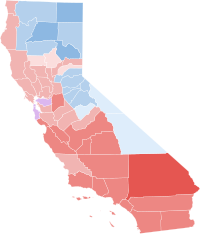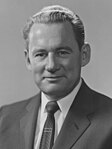1958 United States Senate election in California
 From Wikipedia - Reading time: 10 min
From Wikipedia - Reading time: 10 min
| |||||||||||||||||
| |||||||||||||||||
 County results Engle: 50–60% 60–70% 70–80% 80–90% Knight: 50–60% | |||||||||||||||||
| |||||||||||||||||
| Elections in California |
|---|
 |
The 1958 United States Senate election in California was held on November 4, 1958.
Incumbent senator William F. Knowland opted not to run for re-election, choosing instead to run for election as governor. Incumbent governor Goodwin Knight exchanged places with Knowland and lost to U.S. Representative Clair Engle in the midst of a national landslide for the Democratic Party.
Knowland's decision to run for governor came in spite of strong opposition from Knight, who had wanted to run for re-election rather than for the Senate. The bad impression left by the feud between the two politicians, along with labor mobilization against Proposition 18, was a major factor in the Democratic landslide in California in 1958.[1][2]
This was one of 15 seats Democrats gained from the Republican Party in 1958, part of a record swing.
Republican primary
[edit]Knowland announced his retirement from the Senate in January 1957, ostensibly to spend more time with his family. However, it was an open secret in California Republican politics that Knowland was interested in running for governor. Knowland was hoping to run for president in 1960, and believed that the governorship would provide an effective launching pad for his campaign and allow him to box out potential rival Richard Nixon.[1][2]
Knight, a moderate, pro-labor Republican, disliked the conservative Knowland and opposed his attempt to enter the gubernatorial primary. Knight attempted to box out Knowland by announcing his run for re-election as governor in August 1957; Knowland announced his run for governor two months later. However, Knowland was able to line up support from major Republican donors (including the oil and aircraft industries), the conservative Los Angeles Times, and Richard Nixon, who held significant sway in the California Republican Party. Facing significant pressure and in ill health, Knight eventually relented and switched from the gubernatorial to the senatorial race in November 1957, after receiving assurances that he would receive endorsements from Nixon and Eisenhower as well as organizational support from the California Republican Party.[1][2]
George Christopher, the mayor of San Francisco, had announced his candidacy for the Senate after Knowland's retirement. Christopher accused Knight of a double-cross, as well as ethnic prejudice for trying to run against the first major Greek-American candidate for statewide office. However, the strength of the California Republican organization ultimately helped Knight defeat Christopher in the primary.
Candidates
[edit]- George Christopher, Mayor of San Francisco
- William Jolley
- Goodwin Knight, Governor of California
- Alexander Williamson
Results
[edit]
- 30–40%
- 40–50%
- 50–60%
- 60–70%
- 40–50%
- 30–40%
- 40–50%
- 50–60%
| Party | Candidate | Votes | % | |
|---|---|---|---|---|
| Republican | Goodwin Knight | 790,939 | 49.15% | |
| Republican | George Christopher | 558,245 | 34.69% | |
| Democratic | Clair Engle (cross-filing) | 173,845 | 10.80% | |
| Republican | Alexander D. Williamson | 53,273 | 3.31% | |
| Republican | William Jolley | 32,921 | 2.05% | |
| Total votes | 1,609,223 | 100.00 | ||
Democratic primary
[edit]Candidates
[edit]- Clair Engle, U.S. Representative from Red Bluff
- Fritjof Thygeson
Results
[edit]| Party | Candidate | Votes | % | |
|---|---|---|---|---|
| Democratic | Clair Engle | 1,558,622 | 70.85% | |
| Republican | Goodwin Knight (cross-filing) | 385,170 | 17.51% | |
| Republican | George Christopher (cross-filing) | 221,783 | 10.08% | |
| Democratic | Fritjof Thygeson | 34,316 | 1.56% | |
| Total votes | 2,199,891 | 100.00 | ||
General election
[edit]Results
[edit]| Party | Candidate | Votes | % | ±% | |
|---|---|---|---|---|---|
| Democratic | Clair Engle | 2,927,693 | 57.01% | ||
| Republican | Goodwin Knight | 2,204,337 | 42.93% | ||
| Write-in | Jesse M. Ritchie | 892 | 0.02% | N/A | |
| Write-in | Ray B. Pollard | 281 | 0.01% | N/A | |
| Write-in | All others | 2,018 | 0.04% | N/A | |
| Total votes | 5,135,221 | 100.00 | |||
See also
[edit]References
[edit]- ^ a b c Starr, Kevin (2011). Golden Dreams: California in an Age of Abundance, 1950–1963. Oxford University Press. pp. 212–216. ISBN 978-0-19-515377-4.
- ^ a b c Anderson, Totton J. (1959). "The 1958 Election in California". The Western Political Quarterly. 12 (1). [University of Utah, Sage Publications, Inc., Western Political Science Association]: 276–300. ISSN 0043-4078. JSTOR 444055. Retrieved May 7, 2024.
- ^ "CA US Senate – R Primary". OurCampaigns. Retrieved August 12, 2019.
- ^ "CA US Senate – D Primary". OurCampaigns. Retrieved August 12, 2019.
- ^ "Our Campaigns – CA US Senate". OurCampaigns. Retrieved August 12, 2019.
 KSF
KSF
